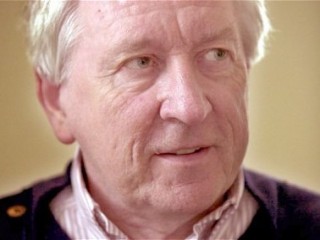
Tomas Transtromer biography
Date of birth : 1931-04-15
Date of death : -
Birthplace : Stockholm, Sweden
Nationality : Swedish
Category : Famous Figures
Last modified : 2011-10-06
Credited as : writer, poet, Nobel Prize for Literature
0 votes so far
While studying at Södra Latin School, Tranströmer started to read and write poetry. In 1956 he received a degree in psychology from the University of Stockholm. He worked for the Psychotechnological Institute at the university, and in 1960 he was employed as a psychologist at Roxtuna, an institution for juvenile offenders.
From the mid-1960s Tranströmer divided his time between his writing and his work. In 1965 he moved with his family to Västerås, a city about sixty miles west of Stockholm. From 1980 he was a psychologist for Arbetsmarknadsinstitutet, a labor organization institute.
Tranströmer made his debut as a poet at the age of twenty-three with 17 dikter (1954). It included poems written in blank verse. Later Tranströmer have experimented with metre, although he has used free verse in most of his his work. Hemligheter på vägen (1958) and Klangar och spår (1966) took up themes from Tranströmer's travels in different parts of the world – the Balkans, Spain, Africa, and the United States. The latter work also included a portrait of the composer Edward Grieg. In 'Izmir klockan tre' (from Hemligheter på vägen) a beggar carries another without legs on his back, and in 'Oklahoma' (from Klanger och spår) the passing cars in dark, with their lights on, turn into flying saucers. 'A Man from Benin' referred to an art work which Tranströmer saw at the Museum für Völkerkunde in Vienna.
Tranströmer's poems are often built around his own experience, around a single, deceptively plain image that opens doors to psychological insights and metaphysical interpretations. Mörkseende (1970) explored the poet's personal life, death and disease among his kin, and a serious crisis. Stigar (1973) consisted of Tranströmer's own poems and translations of poems by Robert Bly and by János Pilinszky. Bly has translated a number of Tranströmer's poems into English. In 2001 the publishing company Bonniers celebrated the poet's 70-year birthday with Air mail, a selection of correspondence between these two writers from 1964 to 1990.
In several poems landscape and its conflicting elements, like the battle between the sea and and land, are used to present confronting forces, freedom and control of speech, nature and human influence on it. Especially his poems about the Baltic archipelago in Östersjöar reflect political conditions in the area – in the 1970s the Baltic countries were still part of the Soviet Union. Movement and change is part of Tranströmer's poetic landscape, although his visions of "cosmic peace" have been criticized by radical writers.
In 1990 Tranströmer suffered from a stroke, which affected his ability to talk. He had published in the previous year his tenth collection, För levande och döda (For the Living and the Dead). After a silence as a writer, Tranströmer returned with Sorgegondolen (1996, grief gondola), which took its title from Franz Listz's two piano pieces. Listz composed them at the time when his son-on-law Richard Wagner died. The book sold 30 000 copies in Sweden. Tranströmer's musical interests are prominent in many collections – he is an accomplished amateur musician, playing piano and organ. In Sorgegondolen the poet acknowledged the limits of his expression, in which the words and all he wants to say 'glimmer just out of reach like a silver in a pawnshop,' ("Det enda jag vill säga / glimmar utom räckhåll / som silvret / hos pantlånaren.") Den stora gåtan, published in 2004, dealt with the the of death. "Death bends over me," he noted.
Besides the Nobel Prize, Tranströmer's awards include the Neustadt International Prize for Literature in 1990, the Bonner Award for Poetry, Germany's Petrarch Prize, Bellman Prize, The Swedish Academy’s Nordic Prize, and August Prize. In 1997 the city of Västerås established a special Tranströmer Prize.
Author of books:
20 Poems tr. Robert Bly (Seventies Press, 1970)
Windows and Stones tr. May Swenson & Leif Sjoberg (University of Pittsburgh Press, 1972)
Baltics tr. Samuel Charters (Oyez, Berkeley, 1975)
Collected Poems tr. Robin Fulton (Bloodaxe Books, 1987)
Sorrow Gondola: Sorgegondolen tr. Robin Fulton (Dedalus Press, 1997)
New Collected Poems tr. Robin Fulton (Bloodaxe Books, 1997)
The Half-Finished Heaven tr. Robert Bly (Graywolf Press, 2001)
The Great Enigma: New Collected Poems tr. Robin Fulton (New Directions, 2006)
The Sorrow Gondola tr. Michael McGriff and Mikaela Grassl (Green Integer, 2010)
New Collected Poems tr. Robin Fulton (Bloodaxe Books, 2011)



















